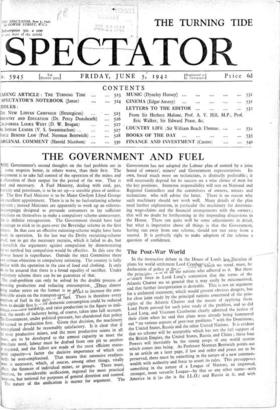THE GOVERNMENT AND FUEL
HE Government's second thoughts on the fuel problem are in some respects better, in others worse, than their first. The vernment is to take full control of the operation of the mines and allocation of their output for the period of the war. That is nd and necessary. A Fuel Ministry, dealing with coal, gas, ctricity and petroleum, is to be set up—a sensible piece of unifica- n. The first Fuel Minister is to be Major Gwilym Lloyd George an excellent appointment. There is to be no fuel-rationing scheme present ; instead Ministers are apparently to work up an exhorta- a-campaign designed to persuade consumers to lay sufficient trictions on themselves to make a compulsory scheme unnecessary. at is definite retrogression. The Government should have had e courage to stick to its guns over the Beveridge scheme in the first ante. In that case an effective rationing-scheme might have been eady in operation. In the last war the Derby recruiting-scheme not to get the necessary recruits, which it failed to do, but demolish the arguments against compulsion by demonstrating at no method but compulsion would be effective. In this case the way house is superfluous. Outside the 1922 Committee there no serious objection to compulsory rationing. The country is fully miliar with the operation in the case of food and clothing. It only sks to be assured that there is a broad equality of sacrifice. Under I voluntary scheme there can be no guarantee of that.
The coal-problem can only be solved by the double process of acreasing production and reducing consumption._ Miady almost
lying undue stress on the former is to
Jidda to increase the con- ttolerable strain on the transport-True:.
There is therefore every
id
amption of fuel in the deli.- ° .
rason to decide first la*
tar domestic consumption could be reduced tithout ev....bive hardship, and raise production to the figure so incli- ned, the needs of industry being, of course, taken into full account. he Government, under political pressure, has abandoned that policy nd turned to production first. Given that decision, the machinery antemplated should be reasonably satisfactory. It is clear that if he most productive mines, and the most productive seams in all nines, are to be developed to the utmost • capacity to meet the rnmediate need, labour must be drafted from one pit to another Ls required, and the fullest use made of the most efficient mana- gerial capacity—a factor the decisive importance of which can hardly be over-emphasised. That means that extensive readjust- tent is necessary, which, of course, among other things, vitally elects the finances of individual mines, or groups. There must, therefore, be considerable unification, regional for most practical purposes, but national for purposes of general direction and control.
The nature of the unification is matter for argument. The Government has not adopted the Labour plan of control by a joint board of owners', miners' and Government representatives. Its own, based much more on technicians, is distinctly preferable ; it will necessarily depend for its success on a wise choice of men for the key positions. Immense responsibility will rest on National and Regional Controllers and the committees of owners, miners and technicians who will advise the latter. There is no reason why such machinery should not work well. Many details of the plan need further explanation, in particular the machinery for determin- ing wage-claims and the financial arrangements with the owners ; that will no doubt be forthcoming in the impending discussions in the House. There can quite well be some adjustments in detail, but what is imperative above all things is that the Government, having run away from one scheme, should not run away from a second. It is perfectly right to make adoption of the scheme a question of confidence.


























